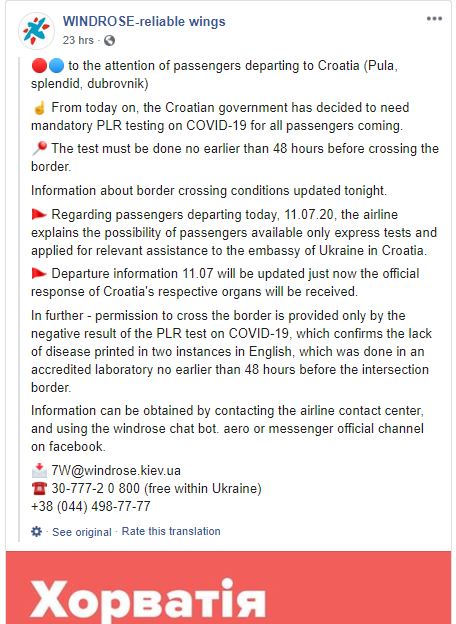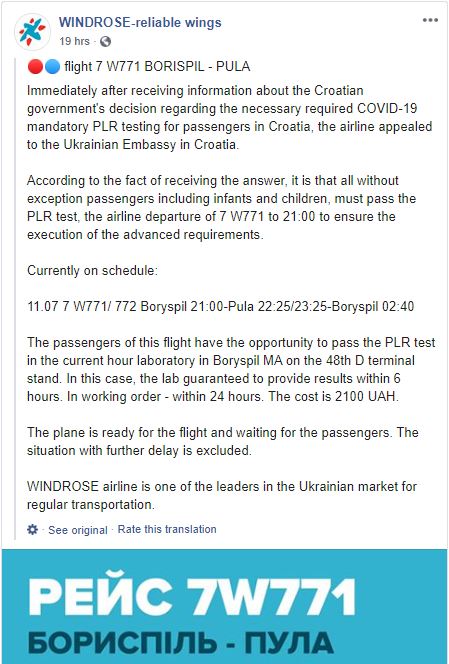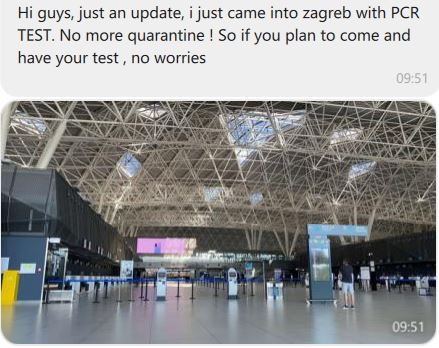To find out more about the Croatian response to global COVID-19 crisis, follow our dedicated section.
Mass Serological Testing Complete, Krunoslav Capak Shares Results
What was feared, but discussed only very quietly, has become a grim reality this week. As Poslovni Dnevnik writes on the 13th of July, 2020 the number of newly infected people in 24 hours in Croatia has now exceeded 100, Krunoslav Capak sat down to explain the situation in more detail.
While for two days in a row we've been recording higher numbers of 140, measures are all out on the table and are being discussed, and depending on the situation, stricter measures may be introduced because the focus has become nightclubs, weddings and all sorts of family gatherings.
The director of the Croatian Institute for Public Health, Krunoslav Capak, explained to RTL just how the preparations for the second wave of the coronavirus pandemic are going
When asked who will control whether people wear masks, Krunoslav Capak stated that the National Civil Protection Headquarters remain against repressive anti-epidemic measures.
"We're against repressive measures because we think they're provoking revolt. We're for people's education on the matter and we think that is enough. We think they'll understand that they need to wear masks in places where there are more people,'' he stated in hope, adding:
"Control is possible, and there's a possibility that civil protection officers or the police will be obliged to do so."
Will there be a scene like the recent one when the police dealt with one person who was riding a train without a mask?
''If public order and peace are disturbed, then the police are called. In my opinion, this type of supervision shouldn't be carried out. We'll see how it goes. I think it's important to wear masks indoors where there is a high risk of spreading the infection,'' Krunoslav Capak replied.
He said that there are fines for the non-implementation of measures related to the protection of public health, and Krunoslav Capak pointed out that dealing punishments for not wearing masks will be the last resort because he thinks that education and appeals for compliance are much more important than repression is
"The WHO has been saying for several days that a much more complicated situation awaits us in autumn than the one we're experiencing now, and we're preparing for it. If it gets worse, it will be important that people wear masks in other places, so in a way, we can consider all this to be a preparation for autumn. The most important thing is that we educate people and that they get used to the fact that it's important to apply preventive measures, and I think that repression is much less important than that,'' he noted.
Quarantine, Capak points out, prevents the spread of the virus, but it is also unsustainable for a number of reasons - both in an economic and in a psychological sense.
"I don't think that we'll bring quarantine in again in autumn, but that we'll manage suppress the spread of coronavirus with segmental and rapid measures. The virus will remain among us, we'd like it to be smaller numbers than it is now and we're working intensively on that. Coronavirus is here, it is among us and it will not disappear,'' he stated.
One of the measures regards reporting gatherings of over 100 people...
"We'll explain this decision at a press conference tomorrow. We think that for those gatherings for which there is otherwise a vertical list, such as religious events, there should be no obligation to report it. This refers more to family gatherings in restaurants, hotels, fire houses, where our source of infection is at the moment. We've already prescribed measures for indoor pools, they're wide and high spaces where there is a lot of air, there is a limited number of visitors. I think it's less than a hundred people, but we can also revise it,'' said Krunoslav Capak.
When asked if he would respond to an invitation to a wedding with 300 guests, he said that he had already said that he wouldn't unless it was a member of his immediate family.
"Given how much the virus is present in the population now, the organisation of such weddings is very demanding and challenging. We've prescribed measures and strengthened them. If they're all adhered to, there will be no transmission of the infection. Such a wedding will go well. However, 300 people in one place is always a risk,'' he explained.
Seven days have passed since the election, and Capak says we don’t have any infections related to the election. He emphasised that it is necessary to wait fourteen days for the maximum incubation time to pass and then look at the situation.
"So far, we've not reported any cases,'' he said.
President Zoran Milanovic compared the coronavirus to tooth decay. Krunoslav Capak said that the Headquarters, as far as he knows, hasn't talked to him so far. He doesn't consider his statement a slap in the face to the Headquarters, but thinks that he wanted to say that it is an infection that can be compared to some other banal disease.
"I think the intention to alleviate panic and fear of infection is a bit exaggerated because tooth decay is something banal that is relatively easy to deal with, while this is one serious disease of which we have thirteen million sufferers and half a million deaths worldwide."
Krunoslav Capak said they had completed a serological survey in Croatia and would release the results perhaps as early as tomorrow, if not in the coming days.
“2.4 percent of the respondents, 1,054 of them, have developed antibodies that prove they have had an encounter with the new coronavirus. Which is a lot more than the number of recorded patients we have. This means that there are many more people among us who have encountered the infection than we know. Only a few of them have neutralising antibodies, meaning they're not protected from re-infection. We analysed it carefully. Only 2 percent of those who have IGG antibodies have neutralising antibodies, which means they're not protected from re-infection," Krunoslav Capak told RTL.
For more on coronavirus in Croatia, follow our dedicated section.
Croatian Tourism: Foreign River Cruise Ships Want to Enter But They Can't
When one thinks of Croatian tourism, they likely think of the coast, but as the limelight is finally being shone on continental Croatia, what about cruises along the country's inland rivers? As Novac writes on the 11th of July, 2020, the Croatian Chamber of Commerce (HGK) River Tourism Association has demanded that "river cruising", ie passenger ships carrying more than forty passengers, be allowed to dock in Croatia's inland ports, which is currently prohibited.
Namely, due to the coronavirus pandemic, at the end of May this year, a Decision was passed on the necessary measure of banning the entry of passenger ships on international cruises to Croatian seaports and inland ports. This decision introduced a ban on the entry of passenger ships carrying more than forty passengers to Croatian inland ports and thus directly prevented the return of river cruise tourism, given that river cruisers have a capacity of up to 220 passengers.
"It isn't profitable for companies to operate with less than twenty percent of their usual capacity. I'd like to emphasise that the companies, in accordance with the measures adopted, have already made sure to secure five percent of their passenger capacity for accommodation in case one of their passengers becomes infected with coronavirus, and therefore I urge that the decision be changed as soon as possible,'' said Bozana Matos, president of the HGK River Tourism Association which sent a letter on behalf of the assotiation, ie a request to amend the Decision to the Ministry of the Interior, the Ministry of Maritime Affairs, Transport and Infrastructure, the Ministry of Tourism and the Croatian Institute of Public Health.
Croatian tourism still focuses primarily on the sea, but the country is actually very well recognised as a river cruise destination. Last year, 61,000 passengers visited Eastern Slavonia and Baranja by river, and passenger ports on the Danube and Drava recorded 560 docks with continuous annual positive growth trends. In June, some river cruise programmes began, in compliance with all of the epidemiological recommendations of the time, organised by the German company Nicko Cruises, and announcements of the return of river cruises continue, organised by A-Rosa, European Waterways and Croisi Europe.
"Some of these cruise companies have cruise programmes in Croatia, and the current Decision doesn't allow them to dock in one of the passenger ports along the Danube and the Drava, so we need to urgently change the Decision, which wouldn't limit the number of passengers on river cruises," explained Matos, noting that this should be re-visited with a special emphasis placed on the context of the latest data on the decline in the number of foreign cruise ships in Croatian seaports.
According to the CBS, in the first five months of 2020, foreign cruise ships recorded a decrease in the number of voyages of 91.2 percent and the number of days spent on the Croatian Adriatic declined by 87.8 percent when compared to the same period back in 2019. The number of passengers on these ships recorded an enormous and concerning decrease of 98.5 percent when compared to the same period in 2019.
"Unfortunately, these are very bad numbers and Croatia will need a long time to recover from this situation, but at the same time, this is an opportunity to strengthen the river cruise sector, provided that the decision is changed in time," said Matos.
The recommendations introduced measures to protect passengers on vessels in order to prevent the spread of the new coronavirus, such as daily temperature measurements, mandatory social distancing, wearing masks, special epidemiological measures during boarding and disembarking and so forth.
For more on Croatian tourism in the coronavirus era, follow our travel page.
Croatia Confirms 50 New Coronavirus Cases, One Death
ZAGREB, July 12, 2020 - Over the past 24 hours there have been 50 new SARS-CoV-2 cases in Croatia and one more death, and the current number of patients is 1,117, the national COVID-19 response team said on Sunday.
Currently 132 patients are hospitalised, including three on ventilators, while 4,861 persons are self-isolating.
Since February 25, when the first case was recorded in Croatia, 3,722 persons have been infected with the novel coronavirus, 119 of whom have died and 2,586 have recovered.
To date 93,571 tests have been done, including 763 over the past 24 hours.
Complying with the measures and directions imposed so far is key, as only by behaving responsibly can we reduce the spread of coronavrus infection, the team said in a press release. "Everyone must be aware of their responsibility for their own health, the health of their family and fellow citizens."
Beros: Croatia Uses One of Best Tests for COVID-19
ZAGREB, July 12, 2020 - Health Minister Vili Beros said on Saturday that Croatia uses one of the best tests for COVID-19 and that the government will try to ensure a more affordable cost of testing for citizens who want to do a test for their own purposes.
"Testing for COVID-19 for all Croatian citizens for whom, in doctors' estimates, there are indications is completely free of charge," Beros wrote in a Facebook post.
"One of the best tests, with a very high rate of reliability, is used in Croatia. It is somewhat more expensive, but the accuracy of the results is important to us. For all citizens who want to be tested for their own purposes, we will try to ensure a more affordable cost of testing," the minister said.
Croatian Police Publish New Official Border Guidelines, Effective July 11, 2020
July 26, 2020* - The Croatian Ministry of the Interior has updated its official border guidelines in English, German and Croatian.
INTRODUCTORY NOTES
Croatian nationals and their family members, regardless of their citizenship, are free to enter the Republic of Croatia, without the need to prove their reasons for entry, but they must present a document proving kinship with a Croatian national (e.g. birth certificate).
When entering the Republic of Croatia, nationals of Member States of the European Union, i.e. Schengen Member States and Member States associated with the Schengen area, as well as their family members (regardless of their residence), and third-country nationals who are long-term residents under Council Directive 2003/109/EC (of 25 November 2003 concerning the status of third-country nationals who are long-term residents) and persons entitled to reside under other EU directives or national law or persons who hold national long-term visas are not required to provide any special reason for their entry (business, economic, tourist, etc.), but can enter the country under the same conditions as before the COVID-19 outbreak, although still under epidemiological control and by mandatory compliance with general and special recommendations issued by the Croatian Institute of Public Health.
This also applies to nationals of the Principality of Andorra, the Republic of San Marino, the Principality of Monaco and the Holy See.
THIRD-COUNTRY NATIONALS
1. If foreigners do not hold the citizenship of an EU/EEA Member State or the aforementioned countries, nor have regulated stay in those countries and travel from a non-member country due to urgent personal reasons, they must prove their reason for entering the Republic of Croatia upon arriving at the border crossing point which could be:
- urgent personal reasons – it is necessary to present valid documentation for example in case of:
- going to a funeral (e.g. death certificate, obituary)
- going to a treatment or accompanying the person going to a treatment (e.g. medical call, confirmation of a scheduled medical / dental examination, doctor’s recommendation)
- if you are the owner or lessee (also applies to leaseholders) of real estate, movable property or seagoing vessel (ship, yacht, etc.) in the Republic of Croatia, border control at the border crossing point in the Republic of Croatia must be accompanied by presenting the documentation proving the ownership of real estate / movable property in the Republic of Croatia (e.g. title deed/contract); members of the owner’s family will be allowed to enter upon presenting a valid document from which the kinship with the owner is visible.
A quarantine/self-isolation measure with health supervision for 14 days has been determined for these persons, with the possibility of shortening its duration to 7 days, if a person gets their nose and throat swabbed at their own expense seven days after entering Croatia and receives a negative PCR test result for SARS-CoV-2.
2. If foreigners who do not hold the citizenship of an EU/EEA Member State or the aforementioned countries nor have regulated stay in those countries want to enter the Republic of Croatia due to:
- Business reasons or economic interest of the Republic of Croatia – it is necessary to present documentation proving the business reason for visiting the Republic of Croatia or the economic interest of the Republic of Croatia, such as an invitation to a meeting of an economic entity from the Republic of Croatia, proof of a board membership, proof of ownership or co-ownership share in a company registered in the Republic of Croatia, documentation on the agreed business obligation with a natural or legal person etc.
- Tourist reasons – it is necessary to present a confirmation of paid accommodation in one of the accommodation facilities in the Republic of Croatia (lease contract or lump sum payment of a camp, permanent berth contract in a nautical tourism port, etc.) and
- Education - it is necessary to present a proof of education / studying (e.g. index, certificate of an educational institution, etc.).
These persons are not subject to a quarantine/self-isolation measure if they present a negative PCR result of a nasal and throat swab for SARS-Cov-2 at the border crossing point, which is not older than 48 hours (counting from the time of taking the swab to arriving at the border crossing point).
Persons who do not present a negative PCR result are subject to a mandatory 14-day quarantine / self-isolation measure.
(Additional clarification of this rule: Those whose test is older than 48 hours will be allowed to enter Croatia, but they will be issued a self-isolation order and will have to be tested again locally, at their own expense. Having an expired PCR test upon arrival will allow for a shortened period of time in self-isolation pending a negative result of a local PCR test. Those who do not provide a negative PCR test upon arrival will be ordered to quarantine/self-isolate for at least 7 days prior to taking a local PCR test.)
Passengers entering Croatia without the obligation of self-isolation shall comply with the following measures during the first two weeks of their stay in Croatia:
During the first 14 days after entering the Republic of Croatia, exits from accommodation are limited only to the necessary ones: performance of work if it is a business reason for entering the Republic of Croatia, or of necessary activities with the continuous intensified implementation of hygiene measures: https://www.hzjz.hr/wp-content/uploads/2020/03/Recommendations-and-Instructions_EN-1.pdf
In order to shorten the procedure at the border crossing point, we advise you to fill the announcement in advance at https://entercroatia.mup.hr.
TRANSIT
Passengers in transit may travel through the Republic of Croatia provided that it is possible to enter or transit through the neighbouring country. During transit, the shortest traffic routes should be used without undue delay, including the motorway where possible. It is necessary to leave the Republic of Croatia as soon as possible and no longer than 12 hours from the moment of entry, which will be checked by the border police.
The confirmation of paid accommodation in an accommodation establishment includes:
- Confirmation, order, invoice for payment of accommodation of all accommodation service providers / all types of accommodation
- Camp lease contract
- Permanent berth contract in a nautical tourism port
- Travel agency voucher etc.
Dear passengers,
Stay Safe While Traveling with Croatian Motorways COVID-19 Campaign
July 12, 2020 - Given the increase in the number of infected in Croatia and other European countries, but also the intensification of tourist traffic, Croatian Motorways has launched an informative campaign for safe travel during the coronavirus pandemic.
HRTurizam reports that posters calling for compliance with epidemiological measures are being placed on the entire network of HAC and ARZ shares, and they will be located at rest stops, sales offices and petrol stations of INA, CRODUX, TIFON and PETROL, which are campaign partners. The bilingual posters contain a QR code link to the koronavirus.hr website.
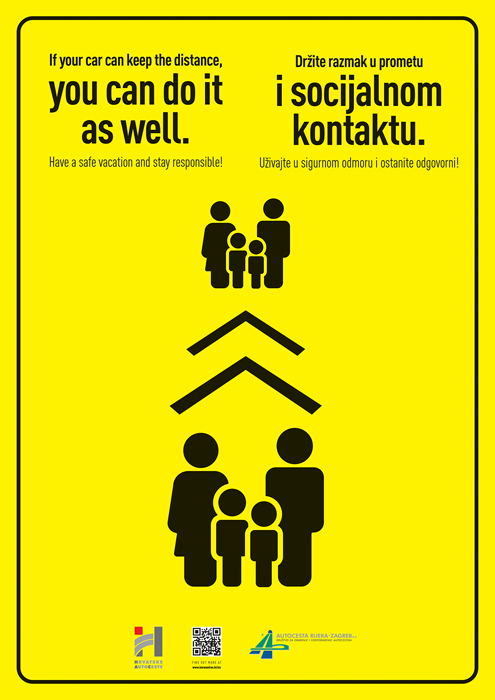
Also, a leaflet in 8 languages was prepared and distributed to Croatian National Tourist Board offices, HAK, car clubs and camping organizations in the countries from which the majority of motorized tourist traffic comes. The leaflets contain information on travel planning, contactless payment models as well as recommendations for adhering to epidemiological measures.

With the opening of borders, the arrival of foreign tourists and the holiday season for domestic users, traffic on motorways is also increasing.
52 percent of last year's tourist traffic was realized in July by July 9, and there are currently 500,000 tourists in Croatia.
Although HAC and ARZ currently account for approximately 70% of last year's traffic, peak loads on the roads also create traffic jams on motorway facilities, so a balanced information campaign seeks to maintain coronavirus awareness and encourage responsible behavior.
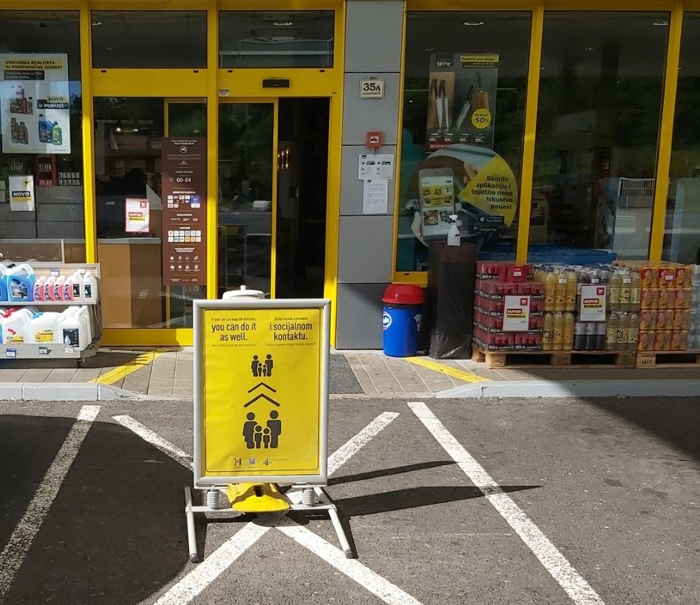
"During the summer season, HAC conducts campaigns related to travel and safety on highways. After the excellent response of users to the campaign "Emergency Corridor Saves Lives", we planned a campaign for senior drivers for this season, but the conditions of the new normal imposed other priorities," said the President of the Board of HAC, Ph.D. Boris Huzjan.
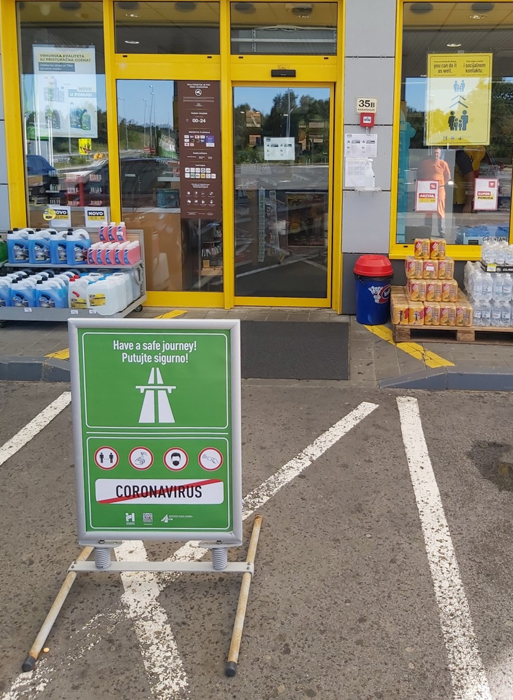
The messages of the information campaign were harmonized by the experts and the Civil Protection Headquarters of the Republic of Croatia, and the templates of the information posters were given to other motorway concessionaires in the Republic of Croatia, Croatian Motorways concludes.
To read more about travel in Croatia, follow TCN's dedicated page.
Krunoslav Capak on COVID-19 in Croatia: These are Big Numbers, We are Worried
July 12, 2020 - The director of the Croatian Institute of Public Health, Krunoslav Capak, spoke about COVID-19 in Croatia and the record 140 new cases on Saturday.
Index.hr reports that the number of currently active cases in Croatia on Saturday is a total of 1088. Among them, 124 patients are in hospital, of which three are on a ventilator. One person died.
Capak commented on the record number of new cases in Croatia as a guest of Dnevnik N1.
"It's not exponential growth, it would be more new patients every day, but these are big numbers, and unfortunately, we have an increase we don't want and we didn't expect it to be like that. By opening activities, we knew we would have bigger numbers, but these are big numbers now and we are worried about that. We ask the citizens to adhere to the measures because it is obviously not working as it is now," Capak said, adding:
"The virus is circulating, but I would not say that the situation is spiraling out of control. Our epidemiologists are working 24 hours a day. The situation is getting worse and worse, and we need to find, enter, and determine all contacts of these 140 people. It is hard work, and we have a total of a hundred epidemiologists. They are running out of energy."
He said they were discussing how to make things easier and when to call for help.
Capak said there are new measures from Monday and they are not thinking about adding others. "The number of people at public gatherings in other countries is smaller than in our country. Since we are a tourist country, we were too liberal in prescribing new measures. That is why we brought new measures for larger gatherings. As with nightclubs, we introduced controls and they are no longer a source of infection. We are now introducing the supervision of various gatherings, and we have tightened measures and recommendations."
Commenting on the restrictions Istria is considering, he said that they are discussing it, but nothing has been agreed yet.
"These are EU rules, I can only comment on epidemiological measures. Of course, Croatian citizens can be infected in other countries and bring an infection, but they are also subject to instructions at the borders. Every citizen who crosses, regardless of whether they are from the EU or not, receives instructions at the border on how to behave for the next 14 days, where it is prescribed to avoid contact, wear masks ... It's just a small step under self-isolation," said Capak answering the question about border crossings and noted that everything is a matter of personal responsibility:
"We had a great collaboration with the citizens, and I hope it will be the same in the future."
We are monitoring the situation with the import of the virus, he pointed out, and said that the measures have now only been tightened. Capak added that the number of border crossings had been significantly reduced.
"We are continuously discussing the gradual introduction of masks into the lives of citizens. We are careful in that, we are gradually moving from the place where the risk is greatest, and then to places where there is not so much risk of infection," said Capak, and commented on fines for those who do not wear masks:
"As the Headquarters, we are against repression because it causes revolt among citizens, especially if it is not precisely and fairly elaborated. We will conduct extensive education on the benefits of wearing masks. In some cultures, wearing masks is a normal thing for any respiratory infection. We have to activate so that the citizens understand that they benefit from wearing masks," concluded Capak.
To read more news in Croatia, follow TCN's dedicated page.
Confusion Reigns After Sudden Croatian Border Requirement Change for Non-EU Citizens
July 12, 2020 - Confusion reigns for thousands of tourists from non-EU countries heading to Croatia after a sudden change in border entry requirements which was implemented almost immediately.
Yesterday was supposed to be a very quiet day. Things were calming down on the work front and I was looking forward to a more relaxing day. So quiet in fact that I gave three TCN writers the day off. The Manjgura interns, who are being so helpful with the Total Croatia Trave INFO Viber community were also off the weekend, as was Kreso Macan, who is the brains behind - and the most resourceful part of - our Viber community.
And then late on Friday, some unexpected measures were announced - changes on border entry and the introduction of masks. Just two days after the New York Times told the world that there was just one country in the world which welcomed Americans with no testing, self-isolating or temperature checks, Croatia introduced the need for a test no older than 48 hours, or a mandatory 14-day self-isolation would be necessary. There was the possibility to lessen this to 7 days with proof of a negative test once inside Croatia.
There were two separate announcements, taking effect on two different dates.
Necessary Measure of Obligatory Use of Face Masks - effective July 13.
Recommendations, Instructions for Crossing Croatian Border - effecting at midnight July 10, just a few hours after the change was announced.
So while we had three days to get used to the idea of masks in more places, the new border rules came into effect almost immediately.
I awoke early to a flood of messages on Viber, including a panicked one from Ukraine. The lady had been informed of the news, and was already at the airport. She had not known she needed a test, did not have one, was only coming for 7 days to Croatia. Would she be allowed on the plane, into Croatia at all? Her flight was due to depart at 12:30.
I hunted around for whatever information I could find - nothing.
Pomalo. It is the weekend in peak season during the corona era. What's the urgency?
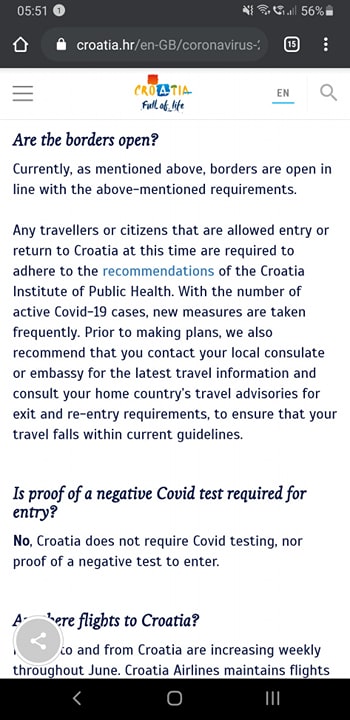
I checked the national tourist board website, which is always full of life, but rarely full of information. And I checked it again at 05:51 this morning. Very helpful. Good job guys, I hope the summer rush is not too stressful.
I then contacted the Swiss aviation data guys at ch-aviation, who are simply the best with the latest info. They told me about the Timatic information system where governments update the system in real time, so that passengers who are ineligible for entry to the country will be denied boarding. As things change quickly, this is updated in real time and is the system that airlines use to check the latest rules.
TIMATIC:
Visa/Entry Requirements National USA (US) /Embarkation USA (US) Destination Croatia (HR)
[Visa Information - Destination] Croatia (HR) [Information For Normal Passports] Passport required.
- Passports and other documents accepted for entry must be valid for a minimum of 3 months beyond the period of intended stay. Passport Exemptions:
- Nationals of USA with an emergency passport. Admission and Transit Restrictions:
- Passengers are not allowed to enter.
- This does not apply to family members of nationals of Austria, Belgium, Bulgaria, Croatia, Cyprus, Czechia, Denmark, Estonia, Finland, France, Germany, Greece, Hungary, Iceland, Ireland (Rep.), Italy, Latvia, Liechtenstein, Lithuania, Luxembourg, Malta, Netherlands, Norway, Poland, Portugal, Romania, Slovakia, Slovenia, Spain, Sweden and Switzerland.
- This does not apply to family members of British nationals.
- This does not apply to passengers entering Croatia to transit by land to a third country. They must prove that they can enter the destination country.
- This does not apply to passengers traveling as tourists.
- This does not apply to passengers traveling on business.
- This does not apply to passengers traveling as students. Visa required, except for Nationals of USA for a maximum stay of 90 days. (SEE NOTE 53527) NOTE 53527: The maximum stay is granted within 180 days.
Additional Information:
- Visitors are required to hold proof of sufficient funds to cover their stay as follows: - at least EUR 70.- per day of stay; or - at least EUR 30.- per day of stay if holding a confirmed invitation or a tourist voucher.
Warning:
- Passports and passport replacing documents issued more than 10 years prior to date of travel are not accepted.
- Passengers traveling as tourist must have a confirmation of accommodation booking.
- Passengers traveling on business must have an invitation letter for a business meeting from a company in Croatia.
- Visitors not holding return/onward tickets could be refused entry .
- Brexit: The United Kingdom stopped being member of the European Union (EU) and of the European Economic Area (EEA). Regulations related to the EU and the EEA apply to the United Kingdom until 31 December 2020. [Health Information] Croatia (HR) Vaccinations not required. CHECK [[TINEWS]] - CHECK LATEST NEWS AND UPDATES ON TRAVEL INFORMATION 12 Jul 2020 / 05:03 [UTC]
The Swiss guys checked again, and yep - nobody has managed to inform Timatic, it would appear, as the travel data corresponds to that of before the announcement, which was made 36 hours ago.
Pomalo, it is the weekend in peak season in the corona era.
Meanwhile, on the runway somewhere in Ukraine, the clock was ticking...
And the airline, Windrose, seemingly did a magnificent job. Here is what they announced on social media:
Followed by this.
The test cost 75 euro, and my understanding (am still hoping to get a first-hand account from the lady posting in our Viber community) is that all 200 passengers were negative after waiting 6 hours to get their test results. The plane left about 21:00 and the tourists entered Croatia without problem.
More questions on the Viber community, from Americans on the way to the airport who did not have time to take a test and get a result before departure. What where they supposed to do?
Who to ask? Pomalo, it is the weekend in peak season in the corona era. Tourism is only 20% of GDP, so why stress?
Thankfully, the two outstanding official bodies who have been heroes throughout this crisis - the Koronavirus.hr website and MUP, the Croatian police (and border control) - came at least partially to the rescue. Koronavirus published three articles with official guidelines, and the fabulous Marina Mandic at MUP answered some of my questions. THe MUP FAQ were updated in Croatian and subsequently in both English and German.
MUP confirmed that the new regulations were already in effect, and that they also applied to the 15 non-EU countries on the EU's safe list.
But there are SO many questions that have come out of this, and confusion reigns once more. I am hoping that there will be more clarity tomorrow when officials get back to their offices, and it is hard to know what to say to incoming tourists who have paid good money to visit Croatia, and then have nobody to be able to answer their basic questions. Another great example of the outstanding performance of the Kings of Accidental Tourism this summer.
My understanding (and PLEASE do not take this as official advice - we hope to bring you that tomorrow) is that original copies of tests will be required if taken in places such as Serbia and BiH (creative fake test results are apparently in circulation there), but it is not clear if that will be the same elsewhere, or if an email confirmation from the testing clinic will be enough.
What happens if your stay is shorter than a week?
What does self-isolation actually mean? Do you have to stay inside the whole time, or can you move around at distance? It seems that you have to stay at the same address for the self-isolation period, which makes sense.
What happens if your test results are not ready by the time you land?
If you are a non-EU citizen with a temporary residency in an EU country, do the testing restrictions apply?
Can you get tested at a Croatian airport?
How will the self-isolation be monitored and enforced?
And 100 questions more. The answer to most of them at the moment is I just don't know.
But we should know more tomorrow.
For anyone who is travelling and has experiences to share, they are invaluable right now. Please share them in our Viber community (you will need to download the app), or email This email address is being protected from spambots. You need JavaScript enabled to view it. Subject Borders. Here is one success story just in from our Viber community.
And one more early piece of feedback on the new rules from the Viber community:
MUP just answered me that if I enter without the test I have to prove paid acomodation at only ONE place for 14 days. Coming from Serbia
For the latest travel info, bookmark our main travel info article, which is updated daily.
Read the Croatian Travel Update in your language - now available in 24 languages
Join the Total Croatia Travel INFO Viber community.
The Netherlands - as of July 21, Croatia is placed on the "Orange" list by the Dutch government, which means that both the Croatian nationals and the Dutch nationals returning to the Netherlands from Croatia are strongly advised to self-quarantine for 14 days.
Croatian President Compares COVID-19 to Tooth Decay?!
July 11, 2020 - Croatian President Zoran Milanović spoke at the opening of Dubrovnik Summer Festival and compared COVID-19 to tooth decay.
President Zoran Milanović said yesterday, and Slobodna Dalmacija reports, that we will have to learn to live with the coronavirus, but that everyone is under a lot of stress caused by a large amount of not-easily-understandable information. He added that especially when watching American and other western TV stations, it appears to him that the whole thing is getting out of control mentally and the people will go crazy in the end, considering how much information they're being fed. And not even those who supply the information completely understand it, let alone the anchors and the audience. He said also that this has become a race in whose study or research will get promoted first, and that it made no sense.
He added that COVID-19 is something we'll have to learn to live with, and the sooner we're able to accept it as a type of normalcy, the better. He proposed we consider COVID-19 "not like some big disease" (this is a direct translation of his words, ne kao neku veliku bolest), rather like tooth decay. That gets cured, Milanović added.
Official Govt Website: Recommendations, Instructions When Organizing an Event
July 10, 2020 - The official Koronavirus.hr website has published new guidelines for organizing events.
These instructions and recommendations are to be applied for all events for 100 and more participants. The organiser is responsible for the implementation of these recommendations.
Organisation of an event
Invitating guestsWhen inviting, organisers should inform guests on the measures in force and provide instructions and information. It is recommended not to invite elderly people or one with chronic diseases.
Visible notices
The obligation to comply with general hygiene measures and physical distance measures, in accordance with the recommendations of the Croatian Institute of Public Health, must be notified in a visible place at the entrance to the premises or immediately after entry.
Seating plan
All seating positions must be marked in advance and moved away from one another to a minimum of 1,5 meters. Organisers should limit the entry to a maximum of as many participants as there are marked sitting positions.
Entrance and seating plan
Participants/guests should enter the venue in a way that they are not retained and grouped together and, as soon as possible, reach their sitting position. It is recommended that persons from the same household are located at the same table. It is also recommended that the seating plan is fixed and stays unchanged during the event.
Record keeping
Before and after entry into the record keeping sheet, the visitors should disinfect their hands. The organiser (private or legal person) should keep a record of participants and staff for 14 days after the event, in order to facilitate contact tracing in case of infection with SARS-CoV-2, and the provision of records to the territorial department in charge of civil protection or the Civil Protection Directorate. Basic data will be collected: name, surname, telephone number and signature of guests.
By signing the record keeping sheet, guest confirms that it has measured the temperature and that it is not higher than 37.2 °C; that it feels well and has no household members in self-isolation; hasn’t travel abroad in the past 14 days abroad, and if so, has a negative PCR test which is not older than 48 hours old: that in the past 14 days hasn’t had a contact with someone infected with SARS-CoV-2; and does not have any of the following symptoms: high body temperature, cough, lack of air, sore throat, runny nose or loss of smell.
Face masks
All staff, except the musicians, at the event have to use a face or medical mask. The staff should use a face or a medical mask covering the nose and mouth. In addition, the have to disinfectant their hands to regularly.
Arrival and behaviour of the guests
Measure body temperature before the arrivalAll guests, organisers and staff are obliged to measure body temperature at the entry point. If it is above 37.2 °C, or if the person feels sick or has any symptoms (all symptoms or signs of illness, not only respiratory diseases), he or she may not take part of the event.
Also, a person may not participate in any case if:
- Has a household member in self isolation
- Has been abroad in the past 14 days, unless has a negative PCR test not older than 48 hours.
- Had a contact with person infected with SAS-CorV-2 in the past 14 days
- Has one of the following symptoms: high body temperature, cough, lack of air, sore throat, runny nose or loss of smell.
Hand-disinfection
During the stay, it is recommended to disinfect hands more frequently. An event organiser is responsible providing disinfectants in sufficient quantities. Before leaving, the guest should disinfect hands.
Physical distancing
For the entire period of stay, including arrival and departure, the physical distance between all guests should be at least 1,5 metre. The organiser has to ensure that at least 3 m² of venue space is planned for each participant. The physical distance rule does not apply between same household members or those who are usually in close contact. It is forbidden to have close physical contacts, like shaking hands, hugging, kissing.
Music
Only performers who haven’t been abroad in the past 14 days, or have a negative PCR test not older than 14 days, can perform. It is recommended that the stage is set at least 4 m from other event participants. The 2 m distance is recommended for singers and musicians with wind instruments. T is mandator to have a 4 m distance between stage performer and audience and to ensure that the performers do not come in close contact with audience and other event participants.
Dancefloor
The total number of people who can be at the same time at the dance floor depends on the total dance floor space and is recommended to provide 4m2 space per each person, except those from the same household.
Serving and consumption of food and beverages
It is recommended to serve foods and beverages in individual portions only at the table in front of guests.
Dishes
Glasses, other dishware and other items mustn’t be shared.
Hygiene of venue space
Air conditioners, heating and ventilation appliancesGeneral recommendation for indoor space is to ventilate by opening windows, and to use ventilation system less. When using ventilation system, particular attention should be noted to filters and maintenance and the regular speed of indoor air substitution. A proper maintenance of ventilation and air ventilation equipment should be carried out on a regular basis. It is recommended ventilate with an increase in the percentage of the outside air circulating in the system and to use the non-recirculation mode in order to incentivise air variation that reduces the concentration of potentially infectious particles.
Cleaning and disinfection
Often contact areas such as door or window handles, working surfaces, handrails, toilet taps, door bells and other contact surfaces used by a large number of people must be disinfected before the event, every two hours after the start, and at the end. When making a sitting plan, ensure considerable time needed for the guests to enter and exit the venue space and in case of two consecutive events ensure enough time for aeration and disinfection of the premises.
Cleaning and disinfection instructions:
For the latest travel info, bookmark our main travel info article, which is updated daily.
Read the Croatian Travel Update in your language - now available in 24 languages


